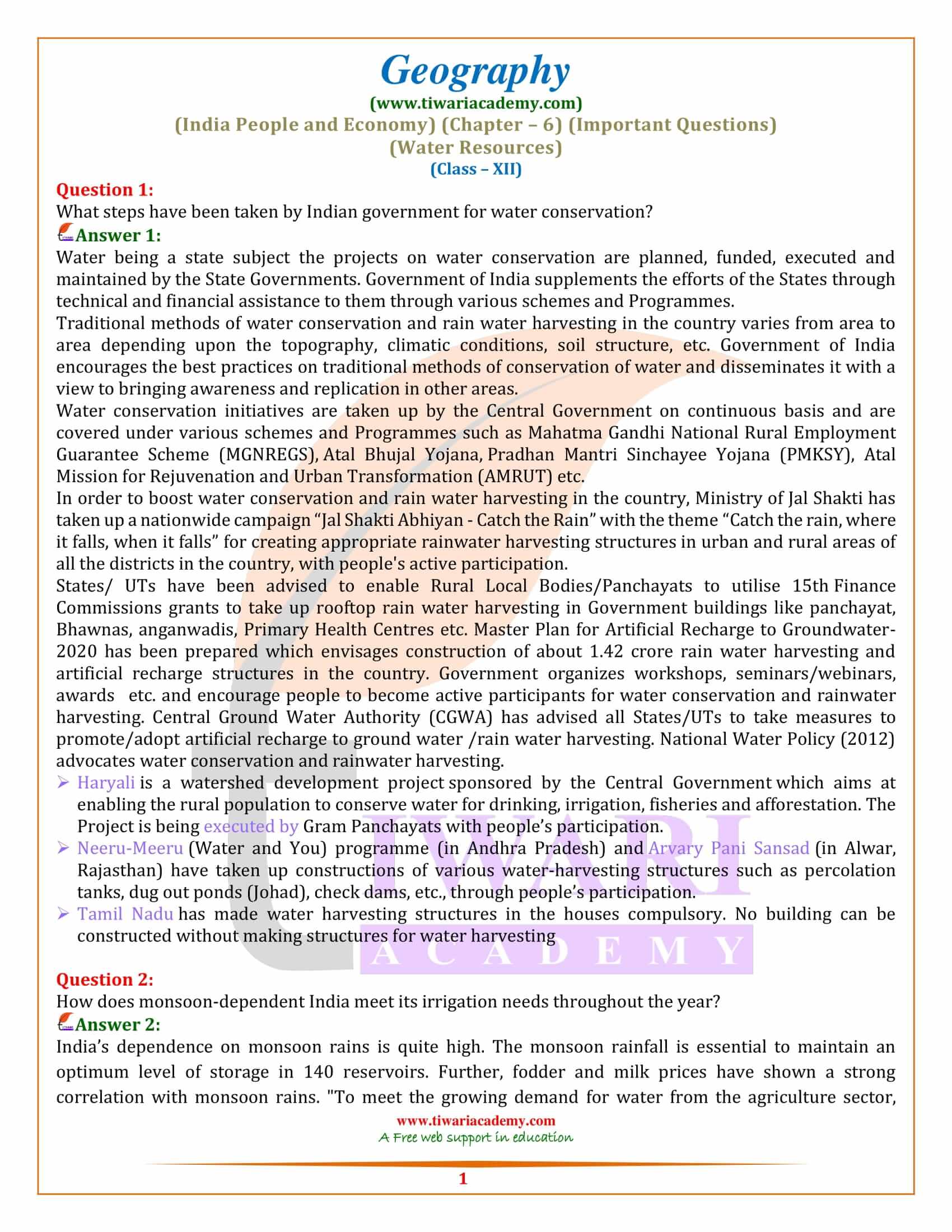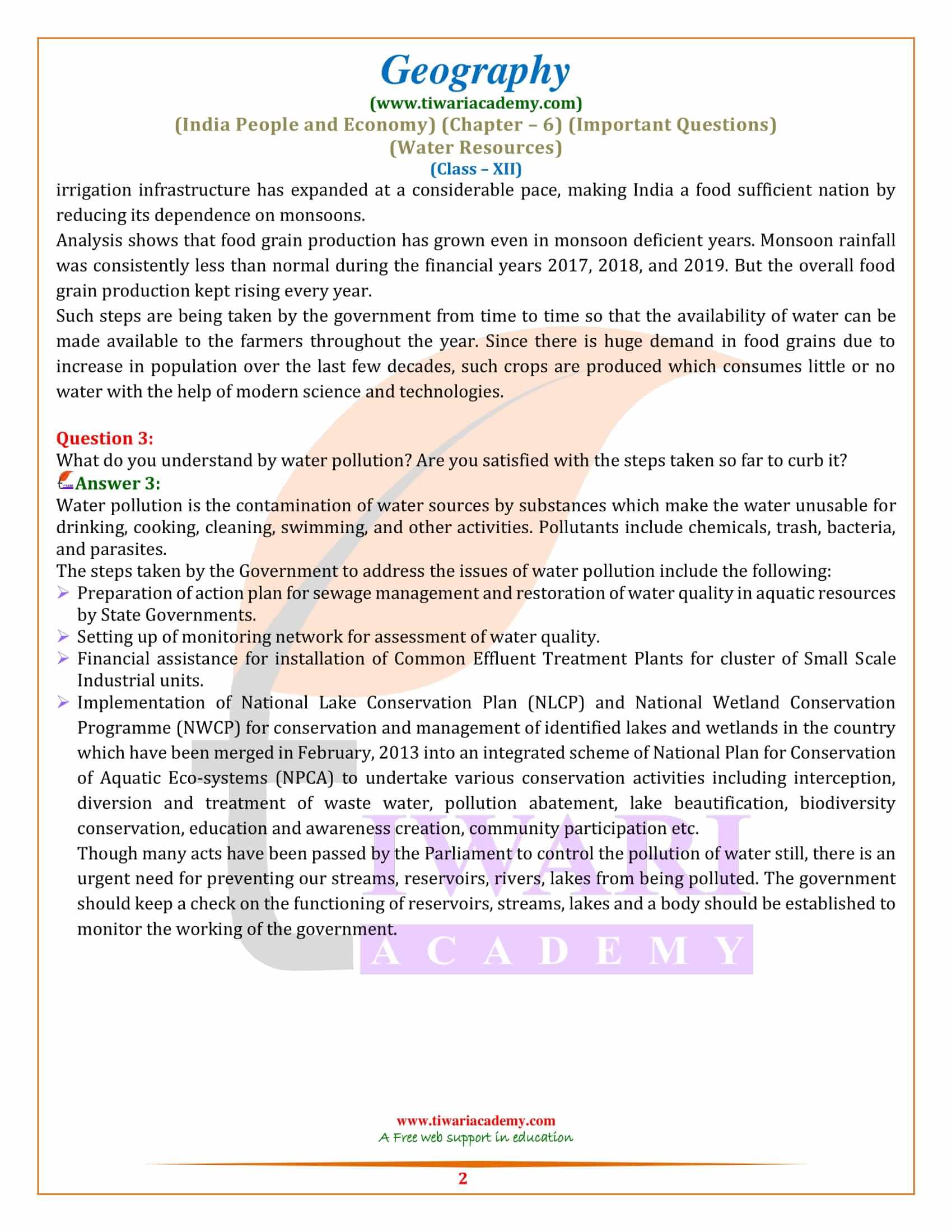Class 12 Geography Part 2 Chapter 6 Important Questions of Water Resources updated for new academic session CBSE and State board students 2025-26 exams. Class 12 Geography chapter 6 extra question answers are given here in the format of short and long answer type questions.
Class 12 Geography Chapter 6 Important Questions
Class 12 Geography Chapter 6 Important Extra Question Answers
What steps have been taken by Indian government for water conservation?
Water being a state subject the projects on water conservation are planned, funded, executed and maintained by the State Governments. Government of India supplements the efforts of the States through technical and financial assistance to them through various schemes and Programmes.
Traditional methods of water conservation and rain water harvesting in the country varies from area to area depending upon the topography, climatic conditions, soil structure, etc. Government of India encourages the best practices on traditional methods of conservation of water and disseminates it with a view to bringing awareness and replication in other areas.
Water conservation initiatives are taken up by the Central Government on continuous basis and are covered under various schemes and Programmes such as Mahatma Gandhi National Rural Employment Guarantee Scheme (MGNREGS), Atal Bhujal Yojana, Pradhan Mantri Sinchayee Yojana (PMKSY), Atal Mission for Rejuvenation and Urban Transformation (AMRUT) etc.
In order to boost water conservation and rain water harvesting in the country, Ministry of Jal Shakti has taken up a nationwide campaign “Jal Shakti Abhiyan – Catch the Rain” with the theme “Catch the rain, where it falls, when it falls” for creating appropriate rainwater harvesting structures in urban and rural areas of all the districts in the country, with people’s active participation.
States/ UTs have been advised to enable Rural Local Bodies/Panchayats to utilise 15th Finance Commissions grants to take up rooftop rain water harvesting in Government buildings like panchayat, Bhawnas, anganwadis, Primary Health Centres etc.
Master Plan for Artificial Recharge to Groundwater- 2020 has been prepared which envisages construction of about 1.42 crore rain water harvesting and artificial recharge structures in the country. Government organizes workshops, seminars/webinars, awards etc. and encourage people to become active participants for water conservation and rainwater harvesting. Central Ground Water Authority (CGWA) has advised all States/UTs to take measures to promote/adopt artificial recharge to ground water /rain water harvesting. National Water Policy (2012) advocates water conservation and rainwater harvesting.
Haryali is a watershed development project sponsored by the Central Government which aims at enabling the rural population to conserve water for drinking, irrigation, fisheries and afforestation. The Project is being executed by Gram Panchayats with people’s participation.
Neeru-Meeru (Water and You) programme (in Andhra Pradesh) and Arvary Pani Sansad (in Alwar, Rajasthan) have taken up constructions of various water-harvesting structures such as percolation tanks, dug out ponds (Johad), check dams, etc., through people’s participation.
Tamil Nadu has made water harvesting structures in the houses compulsory. No building can be constructed without making structures for water harvesting.
How does monsoon-dependent India meet its irrigation needs throughout the year?
India’s dependence on monsoon rains is quite high. The monsoon rainfall is essential to maintain an optimum level of storage in 140 reservoirs. Further, fodder and milk prices have shown a strong correlation with monsoon rains. “To meet the growing demand for water from the agriculture sector, irrigation infrastructure has expanded at a considerable pace, making India a food sufficient nation by reducing its dependence on monsoons.
Analysis shows that food grain production has grown even in monsoon deficient years. Monsoon rainfall was consistently less than normal during the financial years 2017, 2018, and 2019. But the overall food grain production kept rising every year.
Such steps are being taken by the government from time to time so that the availability of water can be made available to the farmers throughout the year. Since there is huge demand in food grains due to increase in population over the last few decades, such crops are produced which consumes little or no water with the help of modern science and technologies.
What do you understand by water pollution? Are you satisfied with the steps taken so far to curb it?
Water pollution is the contamination of water sources by substances which make the water unusable for drinking, cooking, cleaning, swimming, and other activities. Pollutants include chemicals, trash, bacteria, and parasites.
The steps taken by the Government to address the issues of water pollution include the following:
- Preparation of action plan for sewage management and restoration of water quality in aquatic resources by State Governments.
- Setting up of monitoring network for assessment of water quality.
- Financial assistance for installation of Common Effluent Treatment Plants for cluster of Small Scale Industrial units.
Implementation of National Lake Conservation Plan (NLCP) and National Wetland Conservation Programme (NWCP) for conservation and management of identified lakes and wetlands in the country which have been merged in February, 2013 into an integrated scheme of National Plan for Conservation of Aquatic Eco-systems (NPCA) to undertake various conservation activities including interception, diversion and treatment of waste water, pollution abatement, lake beautification, biodiversity conservation, education and awareness creation, community participation etc.
Though many acts have been passed by the Parliament to control the pollution of water still, there is an urgent need for preventing our streams, reservoirs, rivers, lakes from being polluted. The government should keep a check on the functioning of reservoirs, streams, lakes and a body should be established to monitor the working of the government.



